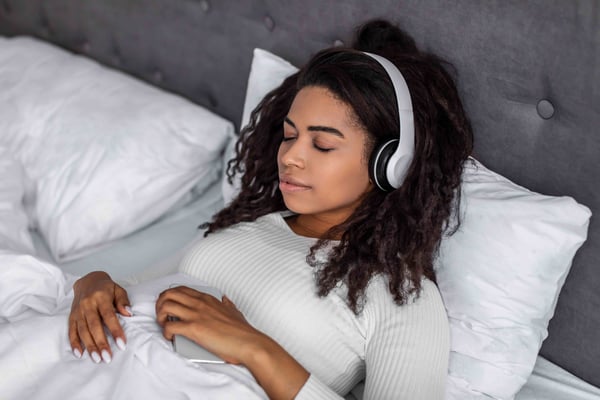Music is a powerful tool. Here are some ways you can use its power for good.
by Chris Schreiber of FEED.FM
As humans, we intuitively acknowledge the power of music to influence our wellbeing—we choose certain music to energize us, to calm us down, or to cheer us up. New research provides evidence for the healing power of music as medicine, including music for relaxation and sleep, music for pain relief, and music for focus.
For health, wellness, and meditation apps, the opportunities to enhance users’ experiences—and even improve their health—through the implementation of specific types of music are nearly limitless.
As noted in the New York Times article, “Music is the Best Medicine,” music therapy is already being effectively used in numerous ways with patients suffering from anxiety, insomnia, depression, cancer, and dementia. As neuroscience and brain research accelerates, there is a growing understanding of music’s impact on the brain, as well as a greater recognition of the vast untapped potential in the use of sound as a healing modality.
To that end, the National Institutes for Health has joined with the John F. Kennedy Center for the Performing Arts and the National Endowment for the Arts on an initiative called Sound Health, with the goal of exploring and researching the interaction of music with the brain and the use of music as medicine.
Lullabies are a time-honored method to help children relax and fall asleep at bedtime gently. As lovely as lullabies are, what if there were a way to make music for sleep even more effective? In a research study published in the Journal of Family Medicine and Primary Care, it was found that playing music at the frequency of 432 Hz for daytime napping participants stimulated significantly increased alpha brain wave activity at the onset of sleep as compared with no music.1
What’s commonly known as “binaural beats” is another approach to music for relaxation and easing the transition to sleep. The term binaural beats describes a phenomenon that occurs when one ear is listening to a sound of a particular frequency, and the other ear is listening to a sound of another frequency. The brain processes the difference between the two frequencies, creating an imaginary third sound, or beat, equal to the difference in amplitude, which is essentially a perceptual illusion.
This binaural beat promotes brain waves that match its frequency, helping the user relax, focus, or fall asleep, depending on the situation. The frequencies may correspond with gamma (heightened focus), beta (focus), alpha (relaxation), theta (deep relaxation or light sleep), or delta (deep sleep) waves. Although clinical trials on the efficacy of binaural beats as music for relaxation are limited, there is evidence that they can help ease anxiety and treat insomnia.2
The use of music for healing is an ancient practice—it’s no coincidence that the Greeks recognized the god Apollo as the patron of both music and medicine. There is currently a great deal of interest in the many ways that music can be instrumental in relieving pain, thus allowing the body to heal more effectively.
Research published in Pain Research and Management studying the effect of low-frequency sound stimulation of 40 Hz on patients with pain related to fibromyalgia found that the subjects experienced statistically and clinically significant improvements from the treatments.3
In a research study on patients undergoing cataract surgery, it was found that
“Music, both with and without binaural beat, was proven to decrease anxiety level and lower systolic BP [blood pressure]” in subjects before and during surgery, as compared with members of the control group who wore headphones without music for pain management. Additionally, the study noted that “Patients who received binaural beat audio showed an additional decrease in heart rate. Binaural beat embedded musical intervention may have benefited over musical intervention alone in decreasing operative anxiety.” 4
With important relevance for music streaming platforms and apps, a study just published in August 2022 found that the relief from acute pain provided by music was enhanced when the subjects were given the impression that they had control over the choice of music.
Anecdotal evidence would indicate that the right study environment, including the right kind of music for focus, is useful for promoting learning and memory. Now there is research to back up this idea.
In a study published in Psychological Research, college students were asked to perform a task while listening to music containing binaural beats in the gamma range. As compared with the control group, who listened to music with a steady frequency of 340 Hz, the members of the experimental group were able to focus more effectively; as the authors write, “high-frequency binaural beats bias the individual attentional processing style towards a reduced spotlight of attention.” 5
As the evidence grows that music as medicine is a powerful medium for healing, many digital apps and content companies are still trying to figure out how to effectively integrate wellness music into their app experience. Feed Media Group is the leading music streaming solution for brands in the health and wellness category, with proven customer results. Our market-tested wellness music collections will help drive higher customer engagement and Net Promoter Scores (NPS) for your business as they delight your users. Music as medicine can be implemented for a wide variety of digital health and wellness applications, including meditation, sleep, focus, recovery, and relaxation.
Talk to a music specialist at Feed Media Group to discuss the ideal music for your health or wellness application.
TALK TO A MUSIC SPECIALIST
This blog post was written while listening to music at 432 Hz.
Feed Media Group is for businesses that need licensed popular music to create the most engaging customer experiences. Unlike navigating complex, time-consuming negotiations with music labels and publishers, Feed Media Group’s proprietary streaming platform and SDKs deliver pre-cleared music—compiled by the industry’s best curators—complete with user analytics, payments to rightsholders, and legal indemnification for our customers.
Feed.fm powers music for the world’s leading brands including American Eagle Outfitters, Mayo Clinic, Mirror, Nautilus, and Tonal; and up-and-coming startups use Adaptr to create unique music-based experiences. Our music partners include Warner, BMG, and Merlin.
1 Pramita Dubey et al., “Effect of music of specific frequency upon the sleep architecture and electroencephalographic pattern of individuals with delayed sleep latency: A daytime nap study,” Journal of Family Medicine and Primary Care, 2019 Dec; 8(12): 3915–3919. doi: 10.4103/jfmpc.jfmpc_575_19
2 Jay Summer, “Can Binaural Beats Help You Fall Asleep?,” Sleep Foundation, September 20, 2022, https://www.sleepfoundation.org/noise-and-sleep/binaural-beats
3 Lili Naghdi et al., “The effect of low-frequency sound stimulation on patients with fibromyalgia: A clinical study,” Pain Research and Management, 2015 Jan-Feb; 20(1): e21–e27. doi: 10.1155/2015/375174
4 D. Wiwatwongwana et al., “The effect of music with and without binaural beat audio on operative anxiety in patients undergoing cataract surgery: a randomized controlled trial,” Eye (London), 2016 Nov;30(11):1407-1414. doi: 10.1038/eye.2016.160.
5 Lorenza Colzato et al., “More attentional focusing through binaural beats: evidence from the global–local task,” Psychological Research, 2017; 81(1): 271–277. Published online 2015 Nov 26. doi: 10.1007/s00426-015-0727-0
Email address is not displayed with comments
Note: Use HTML tags like <b> <i> and <ul> to style your text. URLs automatically linked.
With the internet and digital technologies driving rapid change within the music industry, articles about new releases and who has been hired and fired are no longer enough. Our up to the minute industry news alongside insightful commentary helps our readers sift through the rumors and developments to find the information they need to keep their businesses moving forward.
Hypebot is read daily by more than 30,000 music industry professionals including executives and senior staff of music related tech firms, internet based music sites, every major label group and most indies as well as many managers, artists and members of the live music community:
Contact us for the latesst stats, ad rates and sponosorship opportunites. We also offer combined rates with MusicThinkTank.
“I swear by Hypebot every morning over breakfast.”
Derek Sivers
Founder, CD Baby
“Hypebot is the most focused music business centric resource we have.”
Celia Hirschman
One Little Indian, Downtown Marketing & KCRW-FM
“Well done.”
Seth Godin
Marketing guru


